WTO dispute settlement procedure
WTO世贸组织争端机制

WTO世贸组织争端机制WTO世贸组织争端解决机制(Dispute Settlement Mechanism)是彩票代打兼职骗局WTO成员国之间解决贸易争端的方式和程序。
该机制旨在通过建立一个独立、公正和有效的争端解决机构,维护并推动全球贸易秩序的稳定。
WTO争端解决机制的基本原则是让成员国通过法律程序解决争端,以确保世界上的贸易正义和公平。
它起源于WTO的前身,关税与贸易总协定(GATT)的争端解决机制。
WTO争端解决机制于1995年签署的《WTO争端解决了解》中得到确认与规定,并得到了1995年成立的WTO协议的完善。
WTO争端解决机制的基本流程包括六个阶段:了解阶段、磋商阶段、争端解决案件听证会、专门委员会审议、上诉阶段和执行阶段。
在了解阶段,投诉方需要向被投诉方提供一份书面投诉书,详细说明其对被投诉方的指控。
被投诉方通常会在60天内做出书面答辩。
如果双方不能在此阶段达成解决,投诉方可以向WTO争端解决机构提出请求成立争端解决小组。
磋商阶段是争端解决的第二个阶段,目的是通过对谈来解决争端。
如果谈判没有取得满意的结果,投诉方或被投诉方可以提请WTO争端解决机构成立争端解决小组。
争端解决案件听证会是争端解决的核心环节,由争端解决小组审议。
争端解决小组将聆听双方的陈述和证据,并在一定的时间内作出决定。
争端解决小组的决定需要经双方确认,并在15天内提交WTO争端解决机构。
专门委员会审议是争端解决的下一步,专门委员会将对争端解决小组的决定进行审议。
双方可以在专门委员会审议期间提出对争端解决小组决定的上诉。
上诉阶段是争端解决的最后一个法律程序环节。
上诉机构的任务是对争端解决小组决定的法律解释进行审查。
它是由7位专家组成的,并由WTO总干事主持。
上诉机构的决定是最终和具有约束力的。
最后,执行阶段是争端解决的最后一个阶段。
如果争端解决机构确认了其中一方的违反,并认为这一方没有采取适当的补救措施,投诉方可以要求批准对违反方实施贸易措施。
世界贸易组织争端解决机制
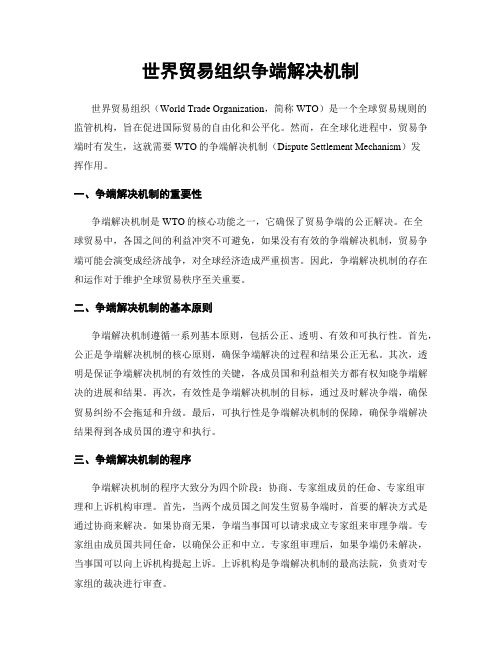
世界贸易组织争端解决机制世界贸易组织(World Trade Organization,简称WTO)是一个全球贸易规则的监管机构,旨在促进国际贸易的自由化和公平化。
然而,在全球化进程中,贸易争端时有发生,这就需要WTO的争端解决机制(Dispute Settlement Mechanism)发挥作用。
一、争端解决机制的重要性争端解决机制是WTO的核心功能之一,它确保了贸易争端的公正解决。
在全球贸易中,各国之间的利益冲突不可避免,如果没有有效的争端解决机制,贸易争端可能会演变成经济战争,对全球经济造成严重损害。
因此,争端解决机制的存在和运作对于维护全球贸易秩序至关重要。
二、争端解决机制的基本原则争端解决机制遵循一系列基本原则,包括公正、透明、有效和可执行性。
首先,公正是争端解决机制的核心原则,确保争端解决的过程和结果公正无私。
其次,透明是保证争端解决机制的有效性的关键,各成员国和利益相关方都有权知晓争端解决的进展和结果。
再次,有效性是争端解决机制的目标,通过及时解决争端,确保贸易纠纷不会拖延和升级。
最后,可执行性是争端解决机制的保障,确保争端解决结果得到各成员国的遵守和执行。
三、争端解决机制的程序争端解决机制的程序大致分为四个阶段:协商、专家组成员的任命、专家组审理和上诉机构审理。
首先,当两个成员国之间发生贸易争端时,首要的解决方式是通过协商来解决。
如果协商无果,争端当事国可以请求成立专家组来审理争端。
专家组由成员国共同任命,以确保公正和中立。
专家组审理后,如果争端仍未解决,当事国可以向上诉机构提起上诉。
上诉机构是争端解决机制的最高法院,负责对专家组的裁决进行审查。
四、争端解决机制的成果争端解决机制的成果是贸易争端解决的最终结果,对各成员国都有约束力。
一方面,争端解决机制可以确保贸易规则的有效执行,保护成员国的合法权益。
另一方面,争端解决机制可以促进贸易争端的和平解决,避免经济战争和贸易保护主义的升级。
gats 和gatt一般原则

GATT(General Agreement on Tariffs and Trade)和GATS (General Agreement on Trade in Services)是世界贸易组织(WTO)的两项重要协议,分别涉及商品贸易和服务贸易。
它们通过制定一系列规则和原则,为全球贸易创造了一个相对平等和公正的环境。
以下是关于GATT和GATS的一般原则的详细介绍和分析:一、GATT的一般原则:1. 最惠国待遇(Most-Favored-Nation Treatment):根据GATT的规定,成员国应当给予其他成员国最惠国待遇,即不得对某一成员国的商品征收比其他成员国更高的关税或其他贸易限制措施。
2. 关税和非关税壁垒的减少(Reduction of Tariffs and Non-Tariff Barriers):GATT鼓励成员国逐步减少关税和非关税壁垒,以促进全球贸易的自由化和便利化。
3. 反倾销措施(Anti-Dumping Measures):GATT允许成员国在某一国家的商品被倾销导致损害自身产业时,采取反倾销措施,以保护本国产业的利益。
4. 争端解决机制(Dispute Settlement Mechanism):GATT建立了争端解决机制,用于处理成员国之间的贸易争端,确保争端得到公正和有效的解决。
二、GATS的一般原则:1. 最惠国待遇(Most-Favored-Nation Treatment):与GATT类似,GATS的最惠国待遇原则要求成员国在服务贸易领域给予其他成员国最惠国待遇,不得对某一成员国的服务商设置更严格的贸易限制。
2. 国民待遇(National Treatment):GATS规定,成员国应当在本国和外国服务商之间实行国民待遇,即不得对外国服务商设置不利的市场准入条件。
3. 透明度和预先通知(Transparency and Pre-Notification):GATS要求成员国在制定或修改与服务贸易有关的法规、政策和措施时,应当尽量公开透明,提前向其他成员国通报相关信息。
WTO争端解决的基本程序0

GATT时代的争端解决程序
第23条 利益的丧失或减损 2.如在一合理时间内有关缔约方未能达成满意的调整,或 如果困难属本条第1款(c)项所述类型,则该事项可提交缔 约方全体。缔约方全体应迅速调查向其提交的任何事项, 并应向其认为有关的缔约方提出适当建议,或酌情就该事 项做出裁定。缔约方全体在认为必要的情况下,可与缔约 方、联合国经济与社会理事会及任何适当的政府间组织进 行磋商。如缔约方全体认为情况足够严重而有理由采取行 动,则它们可授权一个或多个缔约方对任何其他一个或多 个缔约方中止实施在本协定项下承担的、在这种情况下它 们认为适当的减让或其他义务。如对缔约方的减让或其他 义务事实上已中止,则该缔约方有权在采取该行动后不迟 于60天,向缔约方全体的执行秘书提出退出本协定的书面 通知,退出应在执行秘书收到该通知后的第60天生效。
第十讲 WTO争端解决的基本程序
GATT时代的争端解决程序 WTO争端解决的审理程序 WTO争端解决的执行程序
GATT时代的争端解决程序
第22条 磋商 1.每一缔约方应对另一缔约方就影响本协定 运用的任何事项可能提出的交涉给予积极 考虑,并应提供充分的磋商机会。 2.在一缔约方请求下,缔约方全体可就经根 据第1款进行的磋商未能满意解决的任何事 项与任何缔约方进行磋商。
报复的特点及缺陷
不具有惩罚性:DSB授权的中止减让或其 他义务的程度应等于利益丧失或减损的程 度。
不追溯:利益丧失或减损的起算点(合理 期限届满之日) 自力救济
报复的特点及缺陷
Sequencing
如在败诉方是否执行了裁决或执行措施是否与裁决一致的 问题上产生争议,则也应通过援用争端解决程序加以决定, 专家组应在此事项提交其后90天内散发其报告。 (DSU第21.5条) 如果败诉方未能在合理期限内履行裁决,也未能达成各方 满意的补偿协议,则应胜诉方的请求,DSB应在合理期限 结束后30天内,以反向协商一致方式给予中止减让或其他 义务的授权。如对中止程度或报复形式有争议,则应在合 理期限结束之日起60天内通过仲裁解决。 (DSU第22.6条)
反倾销、反补贴、保障和特殊情况处理等(中英文对照)

反倾销、反补贴、保障和特殊情况处理等(中英文对照)Anti-dumping, Subsidies, Safeguards,Contingencies, etc反倾销、反补贴、保障和特殊情况处理等英文来源:/english/thewto_e/whatis_e/tif_e/agrm8_e.htmBinding tariffs, and applying them equally to all trading partners (most-favoured-nation treatment, or MFN) are key to the smooth flow of trade in goods.约束关税及将其在全体贸易成员国之间平等地适用(即最惠国待遇,简称MFN)是保证商品交易过程畅通的关键。
The WTO agreementsuphold the principles, but they also allow exceptions — in some circumstances. Three of these issues are:世贸协议秉持着这些原则,但有时也有例外。
例如以下三种情况:actions taken against dumping (selling at an unfairly low price)1.反倾销(以不公平的低价出售商品的行为)措施;subsidies and special “countervailing” duties to offset the subsidies1.贸易补贴以及为抵消贸易补贴而征收的“反补贴”关税;emergency measures to limit imports temporarily, d esigned to “safeguard”domestic industries.1.为暂时限制进口以“保护”国内产业而采取的紧急应对措施。
Anti-dumping actions反倾销措施If a company exports a product at a price lower than the price it normally charges on its own home market, it is said to be “dumping” the product.如果某一公司以低于其在国内市场正常出售的价格出口某一产品,我们就称其“倾销”该产品。
论WTO争端解决机制的“第三方”制度(一)
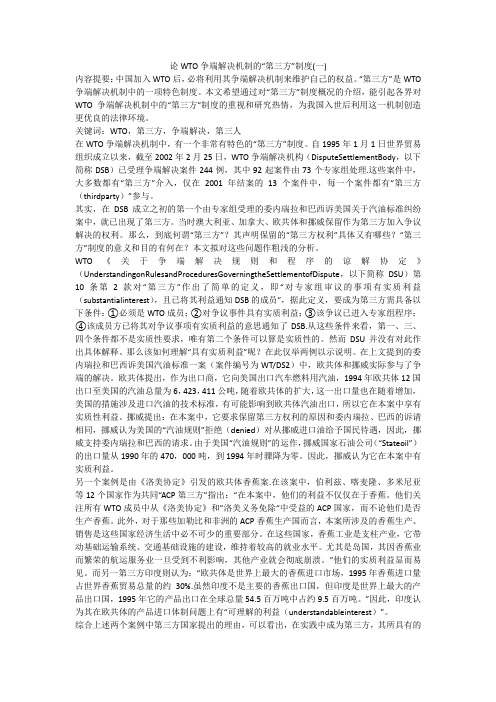
论WTO争端解决机制的“第三方”制度(一)内容提要:中国加入WTO后,必将利用其争端解决机制来维护自己的权益。
“第三方”是WTO 争端解决机制中的一项特色制度。
本文希望通过对“第三方”制度概况的介绍,能引起各界对WTO争端解决机制中的“第三方”制度的重视和研究热情,为我国入世后利用这一机制创造更优良的法律环境。
关键词:WTO,第三方,争端解决,第三人在WTO争端解决机制中,有一个非常有特色的“第三方”制度。
自1995年1月1日世界贸易组织成立以来,截至2002年2月25日,WTO争端解决机构(DisputeSettlementBody,以下简称DSB)已受理争端解决案件244例,其中92起案件由73个专家组处理.这些案件中,大多数都有“第三方”介入,仅在2001年结案的13个案件中,每一个案件都有“第三方(thirdparty)”参与。
其实,在DSB成立之初的第一个由专家组受理的委内瑞拉和巴西诉美国关于汽油标准纠纷案中,就已出现了第三方。
当时澳大利亚、加拿大、欧共体和挪威保留作为第三方加入争议解决的权利。
那么,到底何谓“第三方”?其声明保留的“第三方权利”具体又有哪些?“第三方”制度的意义和目的有何在?本文拟对这些问题作粗浅的分析。
WTO《关于争端解决规则和程序的谅解协定》(UnderstandingonRulesandProceduresGoverningtheSettlementofDispute,以下简称DSU)第10条第2款对“第三方”作出了简单的定义,即“对专家组审议的事项有实质利益(substantialinterest),且已将其利益通知DSB的成员”,据此定义,要成为第三方需具备以下条件:①必须是WTO成员;②对争议事件具有实质利益;③该争议已进入专家组程序;④该成员方已将其对争议事项有实质利益的意思通知了DSB.从这些条件来看,第一、三、四个条件都不是实质性要求,唯有第二个条件可以算是实质性的。
WTO争端解决机制
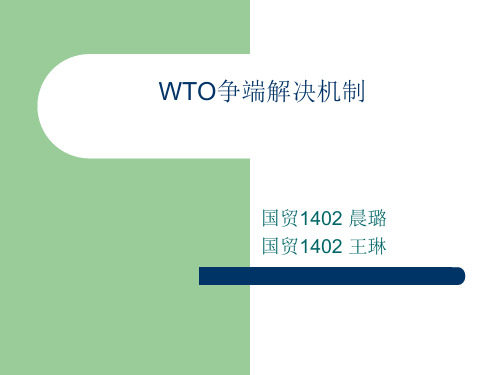
案件事实
5月22日,争端解决机构同意将欧盟请求设立 专家组审理美国钢材保障措施案列入争端解决 机构的议程。6月3日,应欧盟的请求,世界贸 易组织争端解决机构同意设立专家组,并将日 本、韩国的请求列入争端解决机构的议程;中 国、中国台北、巴西、日本、韩国、泰国、加 拿大、挪威、瑞士均表示将作为第三方参与欧 盟申请的专家组的调查和审议工作。
我国要大力宣传保障措施的有关知识 我国加入WTO后才开始对保障措施进行系统性的研究, 社会各界对保障措施的认识还不够,而且国内在此方 面的研究也还处于起步阶段,大多数的企业还不了解 保障措施。只有对相关的知识有了充分的了解,才能 对保障措施进行合理的运用。我国政府的相关部门必 须要有一批熟知保障措施规则的专门人才。产业部门 也要对保障措施有一个初步的了解,知道在保障措施 调查中为自身的合法权益进行有效的抗辩。
争议焦点2:是否存在严重威胁?
WTO《保障措施协议》第4条规定,“严重损害应理解 为对国内产业的状况造成重大的总体损害;严重损害 威胁应理解为严重损害之危急显而易见。严重损害及 严示损害威胁的确定都应基于事实,而非仅凭指控、 推测或极小的可能性而作出。”专家组将对美国报告 中有关严重损害或威胁的数据进行仔细严格的审查, 包括“有关产品进口增长的比例和数量,增长的进口 产品在国内所占市场份额,销售水平、总产量、生产 率、能耗、损益及就业的变化。”以确认报告对严重 损害或严重损害威胁的确认是否符合WTO的规定。
案件事实
根据WTO《关于争端解决规则与程序的谅解》的规定, 在进入专家组审理程序之前,应进行磋商。为此受影 响的成员先后与美国进行了双边磋商,均毫无成果。 3月26日中国、欧盟、日本、韩国、瑞士和挪威等成 员与美国在世界贸易组织机制内进行多边磋商,未能 达成任何解决问题的意向。4月11日至12日,中国、 欧盟、日本、韩国、瑞士和挪威等6方在日内瓦与美 方再次进行磋商,要求美国立即终止这种保护主义措 施,但磋商仍告失败。
wto强制执行措施

河南科技大学毕业论文题目论WTO争端解决机制强制执行措施姓名张华云院系法学院专业法学指导教师常景龙2011年6月8日论WTO争端解决机制强制执行措施ON ENFORCEMENT MEASURES OF WTO DISPUTESETTLEMENT SYSTEM摘要:WTO争端解决机制的构建使其成为国际法上运行比较好的国际组织之一,它的成就有目共睹。
它尝试了很多新的思想,例如反协商一致原则、交叉报复等,让很多情况成为现实,可是一些新的尝试却没有依原意而实施好。
作为最后救济手段的强制执行措施因发达成员的“威慑控制”和自身规定的模糊而加重了成员间权力的失衡,根本没有起到其应有的作用,反而致使一些成员无视WTO规则,无限度地延长执行期限。
因此,加强最后执行手段的强制性成为必要。
本文基于对WTO强制执行措施的现行制度安排的了解,从经济、政治和法治三个角度深入分析了强制执行措施的实施现状,并针对WTO强制执行措施的正当性、有效性和追溯性存在的问题,结合国际法实施的现状和国内外学者们的观点,重点提出了完善WTO自身规定、有限制地建立集体报复制度、建立追溯性惩罚救济措施和承认WTO规则和裁定在国内的效力四条建议。
关键词:WTO;强制执行措施;现状;变革Abstract: The WTO dispute settlement mechanism makes it a better run in the international organization, and its achievement is very evident. It try many new ideas, such as Inverted Consensus, Cross Retaliation and so on, making impossibility a reality, but those new ideas are not implemented by course of the original aim. As a enforcement of the last relief measure, for the developed member’s power and fuzzy rule, increasing the power of the imbalance between members, so it doesn’t play its proper role, which makes some members ignore the WTO rule and extend the performance’s time limitlessly. Therefore, strengthening the power of the last relief measure becomes necessary. This article based on the current arrangement of WTO enforcement, from the economic, political and law three aspects, analysis of the present situation of the implementation deeply. In the light of the problem of WTO enforcement’s legitimacy, effectiveness and retrospect, and combine the international law with the view of various countries scholar. I propound four Suggestions: perfecting the WTO rule, building the system of the collective revenge, building the traceable punish relief measures and admitting the effectiveness inland.Key words:WTO;enforcement measures;current situation;reform目录引言 (1)一、WTO争端解决机制强制执行措施的现行制度安排 (1)(一)G ATT对强制执行措施的规定 (1)(二)W TO对强制执行措施的规定 (2)二、WTO争端解决机制强制执行措施的实施现状 (3)(一)从经济角度看WTO强制执行措施的实施 (3)(二)从政治角度看WTO强制执行措施的实施 (4)(三)从法治角度看WTO强制执行措施的实施 (5)三、WTO争端解决机制强制执行措施存在的根本性问题 (5)(一)W TO裁决自身的正当性有所欠缺 (5)(二)W TO强制执行措施的有效性不足 (7)(三)W TO强制执行措施的追溯性极弱 (8)四、WTO争端解决机制强制执行措施的实质性变革 (8)(一)W TO自身规定的完善 (8)(二)有限制地建立集体报复措施 (9)(三)建立追溯性惩罚救济措施 (10)(四)承认W TO规则和裁定在国内的效力 (10)结语 (11)注释 (12)参考文献 (15)后记 (17)引言最早涉及争端解决强制执行措施的条款来自于1947年《关税与贸易总协定》的第23条,但是受到多方面的限制,规定得并不完备,实施中,它再一次成为了弱肉强食的有力工具。
WTO争端解决程序解析及利用(全文)

WTO争端解决程序解析及利用(全文)范本1:WTO争端解决程序解析及利用一、引言WTO(世界贸易组织)作为国际贸易体系的核心组织,负责监督和促进全球贸易的顺利进行。
然而,由于成员国之间的利益冲突和争端的不可避免性,WTO争端解决程序成为解决贸易争端的重要手段。
本文将对WTO争端解决程序进行深入解析,并探讨其在国际贸易中的实际应用。
二、WTO争端解决程序的概述1. 争端解决程序的目的和原则2. 争端解决程序的基本流程2.1 提交投诉2.2 建立专门争端解决机构2.3 争端解决机构的程序2.4 争端解决机构的决定和执行三、WTO争端解决程序中的关键环节1. 投诉的准备和提交1.1 寻求和收集证据1.2 协商和谈判的过程1.3 编写投诉文件并提交2. 争端解决机构的程序2.1 争端解决机构的组成和规则2.2 申请成为争端解决小组成员的程序2.3 争端解决机构的审理程序2.4 各方的参与权利和义务3. 争端解决机构的决定和执行3.1 争端解决机构的裁决和报告3.2 各方对争端解决机构裁决的权利和义务3.3 争端解决裁决的执行和监督四、WTO争端解决程序的实际应用1. WTO争端解决程序的成功案例分析2. WTO争端解决程序的挑战和改进建议2.1 超期审理和裁决的问题2.2 争端解决程序的透明度和公正性的改进2.3 加强对裁决执行的监督五、结论WTO争端解决程序作为一种法律手段,为国际贸易的顺利发展提供了重要保障。
然而,仍然需要进一步完善和改进该程序,以适应不断变化的贸易争端和国际环境。
附件:WTO争端解决程序相关文件和案例资料法律名词及注释:1. WTO(World Trade Organization,世界贸易组织)- 国际贸易领域的核心组织,负责监督和促进全球贸易的顺利进行。
2. 争端解决机构(Dispute Settlement Body)- 负责处理WTO成员国之间的贸易争端的机构。
3. 裁决(Ruling)- 争端解决机构就争端案件作出的决定和结论。
WTO 争端解决 Dispute Settlement
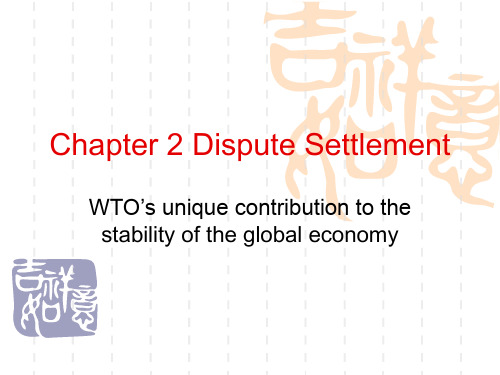
Functions, objectives
1) Providing security and predictability to the multilateral trading system 2) Preserving the rights and obligations of WTO Members 3) Clarification of rights and obligations through interpretation 4) Prompt settlement of disputes 5) Prohibition against unilateral determinations
2、Disputes Settlement Mechanism of WTO
Judicature-oriented USA Diplomatism-oriented Japan Eclecticism the European Communities USD: Understanding on Rules and Procedures Governing the Settlement of Disputes
Procedures
1、consultation procedures 2、good offices, conciliation and mediation 3、panels procedures 4、appellate procedures 5、arbitration
Evaluations of Disputes Settlement Mechanism of WTO
Weakness: 1) despite the deadlines, a full dispute settlement procedure still takes a considerable amount of time, during which the complainant suffers continued economic harm if the challenged measure is indeed (WTO)-inconsistent
国际贸易法律术语
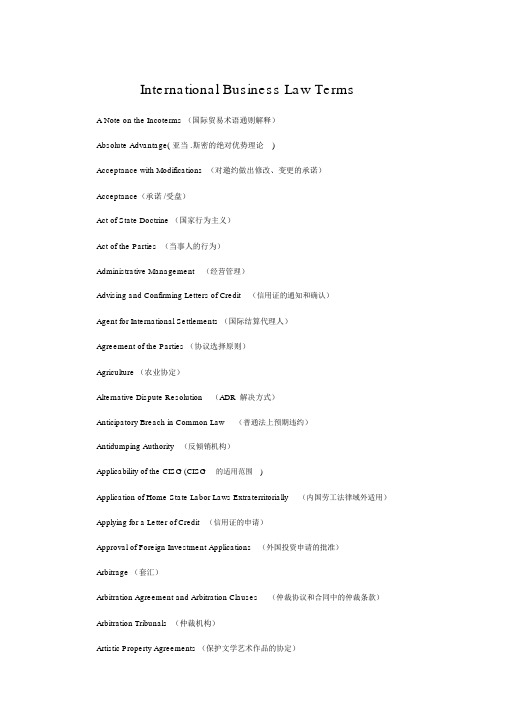
International Business Law TermsA Note on the Incoterms (国际贸易术语通则解释)Absolute Advantage( 亚当 .斯密的绝对优势理论)Acceptance with Modifications (对邀约做出修改、变更的承诺)Acceptance(承诺 /受盘)Act of State Doctrine (国家行为主义)Act of the Parties (当事人的行为)Administrative Management(经营管理)Advising and Confirming Letters of Credit(信用证的通知和确认)Agent for International Settlements (国际结算代理人)Agreement of the Parties (协议选择原则)Agriculture (农业协定)Alternative Dispute Resolution(ADR解决方式)Anticipatory Breach in Common Law(普通法上预期违约)Antidumping Authority(反倾销机构)Applicability of the CISG (CISG的适用范围)Application of Home State Labor Laws Extraterritorially(内国劳工法律域外适用)Applying for a Letter of Credit(信用证的申请)Approval of Foreign Investment Applications(外国投资申请的批准)Arbitrage (套汇)Arbitration Agreement and Arbitration Clauses(仲裁协议和合同中的仲裁条款)Arbitration Tribunals (仲裁机构)Artistic Property Agreements (文学艺术品产权协定)Assignment (合同权利转让)Attorney-General (法律总顾问)Automatic Dissolution(自动散伙)Average Clauses(海损条款)Avoidance (解除)Bank Deposits (银行储蓄)Bases of Income Taxation (所得税的征税依据/基础)Battle of the Forms (形式上的分歧/冲突)Bills of Lading(提单)Branch Banking (银行的分支机构)Business Form and Registered Capital (企业形式和注册资本)Business Forms(商业组织形式)Buyer's Remedies(买方可以采取的救济措施)Carriage of Goods by Air (航空货物运输)Carriage of Goods by Sea and Marine Cargo Insurance (海上货物运输及其保险)Carrier's Duties under a Bill of Lading(在提单运输方式下承运人的责任/义务)Carrier's Immunities (承运人责任/义务的豁免)Cartels (企业联合 /卡特尔 )Categories of Investment Projects (外国投资的项目类别)Charterparties (租船合同)Charterparties by Demise (光船出租合同)China's Fundamental Policies for Encouraging Foreign Investments (中国大陆鼓励外国投资的基本政策)Choosing the Governing Law (准据法的选择)CIF (cost, insurance and freight) (port of destination) (CIF成本\保险费加运费付至指定的目的港)Civil Law ( 民法法系 )Clearance and Settlement Procedures(交换和转让程序)Collection of Documentary Bills Through Banks(银行跟单托收)Commercial Arbitration(国际商事仲裁)Commodity Arrangements (初级产品 /农产品安排)Common Enterprise Liability (企业的一般责任)Common Law ( 普通法系 )Common Procedures in Handling Bills of Exchange(汇票处理的一般程序)Common Stock(股票)Company Taxpayers(公司 /法人企业纳税人)Comparative Advantage( 大卫 .李嘉图的比较优势理论)Comparison of Municipal Legal Systems( 内国法系的比较研究)Compensation for Winding up(清算补偿)Comprehensive Agreements (综合性的协定)Compulsory Licenses (强制许可)Computation of Income (收入计算)Conformity of Goods (与合同约定相符合的货物)Consent to the Jurisdiction of the Host State (给予东道国管辖权的许可/同意)Consideration in Common Law (英美法上的对价)Contemporary International Trade Law (当代国际贸易法)Contract Law for the International Sale of Goods (国际货物销售合同法)Contract Liability of the Agent(代理人的合同义务)Contract Liability of the Principal(委托人的合同义务)Contractual Issues Excluded from the Coverage of CISG (排除在 CISG 适用范围之外的合同问题)Copyrights (著作权 /版权)Council for Trade-Related Aspects of Intellectual Property Rights(与知识产权有关的理事会)Coverage of Tax Treaties (税收条约的覆盖范围)Creation of Agency(代理创立)Creditors of Partners (合伙人的债权人)Currency Crises: The Role of Monetary Policy (金融危机:货币政策的作用与地位)Currency Exchange Obligations of IMF Member States (国际货币基金组织成员国在外汇交易中的义务)Currency Exchange(外汇交易)Currency Support (资金 /财政援助)Custom(习惯)Customs Valuation (海关估价协定)Debt Securities (债券)Decision Making within the WTO(WTO内部决定作出机制)Deficiencies in the GATT 1947 Dispute Process (关税及贸易总协定 1947 争端解决程序的不足)Definite Sum of Money or Monetary Unit of Account(确定货币的总额或者计价的货币单位)Definition and Special Features (定义和特征)Delayed Bills of Lading (提单迟延)Denial of Justice (司法不公)Development Banks(发展银行)Direct Effect (直接效力)Direct Exporting( 直接出口 )Directors' and Officer's Duties to the Corporation (董事和经理 / 首席执行官对公司的义务)Dispute Settlement (争端的解决)Dissolution by Agreement (协议解散)Dissolution by Court Order(依法院令状散伙)Dissolution of the Partnership(散伙)Distribution of Earnings and Recovery of Investments(收入分配和投资回收)Distribution to Shareholders(红利分配权)Doctrine of Imputability (归责原则)Documentary Formalities (文本格式要求)Double Taxation Provision (双重征税的规定)Double Taxation (双重征税)Duress (胁迫行为)Duties of Agent and Principal(代理人和委托人的义务)Duties of Agent to Principal(委托人的义务)Duties of Principal to Agent(代理人、的义务)Duty of Care in Partnership Business (对合伙事务尽心看护义务)Duty of Loyalty and Good Faith(忠诚和诚信义务)Effectiveness of an Offer (邀约 /发盘的效力)Employment Laws in the European Union (欧洲联盟雇佣/ 劳工法)Employment Standards of the Organization for Economic Cooperation and Development (经济合作与发展组织雇佣 /劳工标准)Enforcement of Exchange Control Regulations of IMF Member States (国际货币基金组织成员国对外汇交易管理规则的履行)Enforcement of Foreign Arbitral Awards in the People's Republic of China (在中华人民共和国境内外国仲裁裁决的执行)Enforcement of Foreign Judgment(外国法院判决的执行)Enforcement of Partnership Rights and Liabilities(执行合伙事务的权利和责任)Enforcement of Securities Regulations Internationally(国际证券规则的执行)Environmental Regulation (环境规则)Escape Clause(免责条款)Euro-currency Deposits (欧洲货币储蓄)European Communities - Regime for the Importation, Sale, and Distribution of Bananas (欧洲共同体对于香蕉的进口、销售和分销的管理)European Union Law on Trade in Services (欧洲联盟关于服务贸易的法律)Exceptio non Adimpleti Contractus in Civil Law(大陆法上履行契约之抗辩权)Exceptions (例外)Exclusive Licenses (独占许可)Excuses for Non-performance(不履行的免责)Excuses for Nonperformance (不履行合同的抗辩/借口)Exemptions for New Members from IMF Member State Currency Exchange Obligations (国际货币基金组织新成员国在外汇交易中义务的免除)Export Restrictions ( 出口限制 )Exporting( 出口 )Expropriation (征收)Extraterritorial Application of U. S. Securities Laws(美国证券法域外的适用问题)Failure to Exhaust remedies (没有用尽法律救济)Fault and Causation(过错和因果关系)Finance Ministry (财政部)Finance of International Trade( 国际贸易的结算/ 支付 )Financing Foreign Trade (对外贸易的价金支付)FOB (free on hoard) (port of shipment) (FOB装运港船上交货)Force Majeure Clauses (不可抗力条款)Foreign Investment Guarantees(外国投资的担保)Foreign Investment Laws and Codes (外国投资法)Formal and Informal Application Process (正式和非正式申请程序)Formation of the Contract (合同的成立)Forsed Endorsements(虚假背书)Fraud Exception in Letters of Credit Transaction ( 信用证交易的欺诈例外)Frauds on Bills of Lading (提单欺诈)Fraudulent Misrepresentation (受欺诈的误解)Free Zones(保税区 /自由贸易区)Fundamental Breach(根本违约)GATS Schedules of Specific Commitments (服务贸易总协定减让表中的特别承诺)General Agreement on Trade in Services ( 服务贸易总协定)General Requirements and Rights of the Holder in Due Course (票据持有人的一般要求和权利)General Standards of Performance(履行的一般标准)Geographic Limitations (地区限制)Government Controls over Trade ( 政府对贸易的管制)Government Guarantees(政府担保)Governmental Interest (政府利益原则)Governmental Sources of Capital (官方资金)Grant Back Provisions (回授的规定)Home state Regulation of Multinational Enterprises (本国对跨国企业的管理)Host State Regulation of Multinational Enterprises (东道国对跨国企业的管理)Illegality and Incompetency (行为不合法性与主体不适当资格的认定)IMF "Conditionality"(国际货币基金组织的制约性)IMF Facilities (国际货币基金组织的机制)IMF Operations (国际货币基金组织的运作)IMF Quotas (国际货币基金的份额)Immunities of States from the Jurisdiction of Municipal Courts (国家豁免于内国法院的管辖权)Import-Licensing Procedures (进口许可证程序协定)Income Categories(收入分类)Income Tax Rates(所得税税率)Income Taxes(所得税)Independence Principles and Rule of Strict Compliance (信用证独立原则和单证严格相符规则)Indirect Exporting( 间接出口 )Industrial Property Agreements(保护工业产权的协定)Innocent Misrepresentation (因无知的误解)Inquiry (调查)Insider Trading Regulations (内幕交易规则)Insurance Cover (保险范围)Intellectual Property Right Law(知识产权法)International Center for the Settlement of Investment Disputes(解决投资争端国际中心)International Commercial Dispute Settlement(国际商事争端的解决)International Court of Justice(海牙联合国国际法院)International Factoring(国际保理)International Franchising( 国际特许经营权)International Labor Standards (国际劳工标准)International Licensing Agreement( 国际许可证协议)International Licensing Agreements(国际许可证协定)International Model Law( 国际示范法 )International Organizations( 国际组织 )International Persons(国际法主体)International Rules for the Interpretation of Trade Terms(国际贸易术语解释通则) International Trade Customs and Usages( 国际贸易惯例和习惯)International Treaties and Conventions( 国际条约和公约)International Tribunals(国际法庭)Interpreting of the CISG (CISG的解释)Invitation Offer(要约邀请/要约引诱/询盘)Involuntary Dissolution(非自愿解散)Issuance of Securities(证券发行)Jurisdiction and Venue(管辖权和法院地)Jurisdiction in Civil Cases (民事案件的管辖权)Jurisdiction in Criminal Cases (刑事案件的管辖权)Lack of Genuine Link (缺乏真实的联系)Lack of Nationality (无国籍)Lack of Standing (身份不明)Law Applicable to Letters of Credit(调整信用证的法律)Law of Foreign Investment Enterprises of China(中国的外商投资企业法)Law of the People's Republic of China on Chinese Foreign Contractual Joint Ventures (中华人民共和国中外合作企业法)Law of the People's Republic of China on Chinese Foreign Equity Joint Ventures (中华人民共和国中外合资企业法)Law of the People's Republic of China on Foreign Capital Enterprises (中华人民共和国外资企业法)Legal Characteristics (定义和法律特征)Legal Structure of the WTO(世界贸易组织的法律框架)Legal System of International Business( 国际商事的法律体系)Letters of Credit (L/C) (信用证)Liabilities of Makers, Drawers, Drawees, Endorsers and Accommodation Parties(票据制作人、出票人、付款人、背书人、代发人/担保人的责任)Liability for Environmental Damage(环境损害责任)Liability Limits(承运人责任/义务的限制)Licensing Regulations (许可证制度)Limitations on Foreign Equity (外国投资的资金比例限制)Limitations on the Excuses That Drawers and Makers Can Use to Avoid Paying Off a Billor Note 661 (票据制作人、出票人拒绝付款借口的限制)Liquidated Damages (约定的损害赔偿金)Liquidation(清算)Maintaining Monetary Value (维护币值稳定)精选文库Major Principles of GATT 1994(关税及贸易总协定1947 的主要原则)Marine Insurance Policies and Certificates(海运保险单和证书)Maritime Insurance (海运保险)Maritime Liens(留置权)Means of Delivery (根据交付方式)Mediation (调停 /调解)Membership (成员)Memorandums of Understanding (谅解备忘录)Methods of Investment Contribution (出资方式)Mini-trial(模拟审判方式)Miscellaneous Taxes (混杂的,各种各样的税)Misrepresentation (误解)Mixed Sales (混合销售)Modification of Foreign In vestment Agreements(外国投资协议的修改)Money and Banking( 货币与金融 )Monopoly Control Authority (反垄断机构)Most Significant Relationship (最密切联系原则)Most-favored-nation Treatment(最惠国待遇原则)Movement of Workers (劳工流动)Multilateral Investment Guaranty Programs (多边投资担保计划/安排)Multilateral Trade Agreements (多边贸易协定)Multilateral Trade Negotiations(多边贸易谈判)Multinational Enterprise (跨国企业)Municipal Legal Systems (内国法系)National Foreign Investment Policies (内国的外国投资政策)National Investment Guarantee Programs (内国/国家投资担保计划/安排)National Law( 国内法 )National Monetary Systems (国内金融 / 货币体系)National Treatment(国民待遇原则)Nationality Principle (国籍原则)Negligent (innocent) Misrepresentation (因疏忽的误解)Negotiability of Bills and Negotiability of Notes(可流通的汇票和可流通的本票)Negotiation ( 谈判,议付 )Noncompetition Clauses (限制竞争条款)Nondiscrimination (非歧视原则)Nonimputable Acts (免责行为)Nontariff Barriers to Trade( 非关税贸易壁垒)Nonwrongful Dissolution(非不法原因散伙)Objections (异议)Obligations of the Parties(当事人各方的义务)Obligations of the Seller and the Buyer(买卖双方的合同义务)Offer(要约/发盘)Operation of Law(法律的原因而终止)Operational Reviews (营业审查)Opting In and Out (加入和退出)Organization of the IMF (国际货币基金组织的机构)Overseas Private Investment Corporation (海外私人投资公司的案件)Parent Company(母公司)Passing of Property (产权的转移)Passing of Risk (风险的转移)Patents (专利权)Payable on Demand or at a Definite Time (付款要求或者在指定的付款时间)Payment of the Price(支付价款)Penalties for Noncompliance (对于不遵守法规的处罚)Perils and Losses(保险危险和损失)Persons Immune from Taxation (个人所得税的免除)Piercing the Corporate Veil (普通法上揭开公司的面纱/ 大陆法上公司人格否认原则)Place for Delivery (交付的地点)Post -Termination Relationship (代理终止后的有关问题)Powers during Winding up(合伙人在清算过程中的权力/权利)Practices and Usages(交易习惯和商业惯例)Preemption(先买权 /优先权)Preshipment Inspection (装运前检验协定)Price-Fixing (定价)Private Insurers(私人/商业保险)Private Sources of Capital (私人资金)Products Liability Laws (产品质量法)Promissory Notes (本票)Promoter of International Monetary Cooperation (国际金融合作的促进者)Protection of Natural Resources (自然资源的保护)Protection of Subsidiaries (分支机构的保护制度)Protection of Workers' Rights by the Council of Europe(欧洲理事会关于劳工权利的保护)Protection through Tariffs (关税保护)Proving Foreign Law (外国法的查明)Provisions Governing Trade in Services in the North American Free Trade Agreement (北美自由贸易区协定中关于服务贸易的规定)Quality Controls (质量控制)Quantity and Field-of-Use Restrictions (对数量和使用领域的限制)Recognition and Enforcement of Awards(仲裁裁决的承认和执行)Recognition of Foreign Judgments (外国裁决的承认)Refusal to Exercise Jurisdiction (拒绝执行管辖权)Regional and International Development Agencies (区域性和国际性发展机构)Regional Integration (区域联合)Regional Intergovernmental Regulations on Labor (区域性政府间关于劳工的规定)Regional Intergovernmental Regulations on Trade in Services (关于服务贸易的区域性政府间管理规则)Regional Monetary Systems (区域性金融体系)Regulation of Foreign Workers (外籍员工的的管理规定)Regulation of Pollution (防止污染规则)Relief (救济、赔偿)Remedies Available to Both Buyers and Sellers (买卖双方都可以采取的救济措施)Remedies for Breach of Contract (违反合同的救济)Requests for Specific Performance (要求继续 /特定履行)Residency Principle (居住地原则)Restrictions on Research and Development (对技术研究和发展的限制)Restrictions That Apply after the Expiration of Intellectual Property Rights (知识产权保护期满后应用的限制)Restrictions That Apply after the Expiration of the Licensing Agreement (知识产权使用许可合同期满后应用的限制)Right to Compensation(主张赔偿的权利)Rights and Duties (权利与义务)Rights and Responsibilities of Beneficiaries (收款人 /收益人的权利与义务)Rights and Responsibilities of the Account Party (付款人 /信用证帐户申请人的权利与义务)Rules of Origin (原产地规则)Rules of Private International Law (国际私法规则)Safeguards(保障措施协定)Sanitary and PhytosanitaryMeasures (卫生与植物卫生措施协定)Scope and Coverage of GATT 1947 and GATT 1994 (关税及贸易总协定1947 和 1994文本的调整范围)Screening Foreign Investment Applications (对外国投资申请的筛选/ 审查)Sectoral Limitations (行业 /部门限制)Securities and Exchange Commission (证券交易委员会)Securities Exchanges (证券交易所)Securities Regulations (证券规章)Seller's Obligations (卖方的义务)Seller's Remedies(卖方可以采取的救济措施)Settlement of Disputes between ILO Member States (国际劳工组织成员国之间争端的解决)Settlement of Disputes between Intergovernmental Organizations and Their Employees (政府间国际组织与它的雇员之间争端的解决)Settlement of Disputes in International Tribunals (在国际法庭解决争端)Settlement of Disputes in Municipal Courts(内国法院的争端解决途径)Settlement of Disputes through Diplomacy (通过外交途径解决争端)Settlement of Disputes through Municipal Courts(通过内国法院解决国际商事争端)Shareholders' Inspection and Information Rights (股东的监督和知情权)Shareholders' Lawsuits (股东的诉权)Shareholders' Meetings(股东会议 /大会)Shareholders' Rights and Liabilities(股东的权利和责任)Sharp Practices (欺诈行为)Signed by the Maker or Drawer (票据制作人或者出票人签名)Source Principle (税收发生来源原则)Sources of Corporate Financing (公司资本的来源)Sources of Foreign Investment Law of China(中国外国投资法的渊源)Sources of International Business Law( 国际商法的渊源)Sources of International Law (国际法的渊源)Sources of Investment (投资范围)Sovereign or State Immunity (国家主权豁免)Specialization( 国际分工专门化)Standard of Care(给予外国人的待遇/关照标准 )Start-Up Standards(设立标准)State Responsibility (国家责任)Statements and Conduct of the Parties(当事人的陈述和行为)Statutory Choice-of-Law Provisions(强制选择条款)Structure of the WTO ( WTO 的组织结构)Subordinate Business Structures(商业分支机构)Subsidies and Countervailing Measures (补贴与反补贴措施协定)Supervision of Foreign Investment (外国投资的监管)Supreme Court Decision (最高法院的裁决)Systems for Relief from Double Taxation(避免双重征税的救济体制)Takeover Regulations (接管 /收购规则)Taking Delivery (接受交付)Tariff-based Import Restriction(约束进口关税)Tariffs( 关税 )Tax Avoidance (避税)Tax Evasion (逃税)Tax Incentives ( 税收激励 )Tax Sparing (节税)Tax Treaties (税收条约)Taxation (税收)Taxpayers(纳税人)Technical Barriers to Trade (贸易的技术壁垒)Technology Transfer( 技术转让 )Termination of an Agency(代理的终止)Termination of Corporations(公司的终止)Territorial Restrictions (地区限制)The Acceptance(承诺/受盘)The Administrative Discretion of Screening Authorities(筛选/监管机构的管理权)The Anglo-American Common Law System(普通法系或者英美法系)The Applicable Procedure Law(应用的程序法)The Applicable Substantive Law (应用的实体法)The Bank for International Settlements (巴塞尔国际清算银行)The Bill of Exchange (汇票)The Board of Directors(董事会)The Bretton Woods System (布雷敦森林体系)The Business Form(商业组织形式)The Buyer's Right to Avoid the Contract (买方解除合同的权利)The Central Bank (中央银行)The Choice of Money (货币的选择)The Convention on Insider Trading (内幕交易的公约)The Drafting of the CISG(CISG的起草)the Economic Globalization(经济全球化)The Final Act Embodying the Results of the Uruguay Round of MultilateralTrade Negotiations (乌拉圭回合多边贸易谈判结果的最后文本)The Foreign Exchange Market (外汇交易市场)The Founding of GATT (关税及贸易总协定的成立)The Framework Agreement (协定的框架)The General Agreement on Tariffs and Trade (关税及贸易总协定)The Importance of the Separate Legal Identity of Juridical Entities (跨国企业作为拥有独立法律地位的实体之重要性)The International Labor Organization (国际劳工组织)The International Monetary Fund (国际货币基金组织)The International Standard( 国际待遇 /标准 )The International Transfer of Intellectual Property(工业产权的国际转让)The Islamic Law System (伊斯兰法系)The Law Governing Bills of Exchange(调整汇票的法律制度)The Law of Agency(国际商事代理法)The Making of International Law(国际法的构成)The National Standard( 国民待遇 /标准 )The Negotiation and Transfer of Bills and Notes (票据权利的转让和背书转让)The Obligations of Banks (银行的义务/责任)The Principal Characteristics (基本特征)The Role of Banks in Collecting and Paying Negotiable Instruments (银行在可流通票据的托收和付款中的角色)The Roman-Germanic Civil Law System( 大陆法系或者罗马日耳曼法系)The Scope of International Law in Actual Practice(实践中国际法的范围)The Subordinate Structure (分支结构)The Transfer of Money (货币转移)The Turning Over of Documents (交付与货物有关的单证)The Uruguay Round (乌拉圭回合)The Value of Money (币值)The World Trade Organization (WTO)(世界贸易组织)The WTO Agreement(WTO协定)Third Party Relations of the Principal and the Agent(与委托人和代理人有关的第三人)Third-Party Claims and Personal Injuries (第三方的权利和人身伤害)Third-Party Rights (Himalaya Clause) (第三方的权利---- 喜玛拉亚条款)Time Charterparties(定期租船合同)Time for Delivery(交付的时间)Time Limitations (时效)Trade Barriers (贸易壁垒)Trade in Goods( 货物贸易 )Trade Liberalization Through Cooperation(通过合作实现贸易自由化)Trade Policy Review (贸易政策评审机制)Trade Terms(贸易术语)Trademarks(商标权)Trade-Related Investment Measures (与贸易有关的投资措施协定)Trading in Securities(证券交易)Transactions Covered in CISG ( CISG 适用的交易范围)Transnational Organized Labor (有组织的跨境服务的劳工)Transparency(透明度 )Treaties and Conventions (条约和公约)Trial Court Decision (初等法院的裁决)Turnover Taxes (流转 /交易税)Tying Clauses (搭售条款)Unconditional Promise or Order to Pay (无条件的付款承诺和要求)Unfair Competition Laws (不正当竞争法)UNIDROIT Principles of International Commercial Contracts (PICC)( 国际统一私法协会国际商事合同通则 ,简称 PICC)精选文库United Nations Convention on Contracts for the International Sale of Goods (CISG)( 联合国国际货物销售合同公约 ,简称 CISG)Validity and Formation of International Sale of Contracts(国际货物销售合同的成立和效力)Visas(签证)Voyage Charterparties (航次租船合同)Waivers (让渡、放弃)Winding Up(合伙清算)World Intellectual Property Organization(世界知识产权组织)World Trade Organization Dispute Settlement Procedures (世界贸易组织争端解决机制)Wrongful Dissolution(不法原因散伙)WTO Antidumping Agreement(世界贸易组织反倾销协议)WTO Dispute Settlement Procedures (世界贸易组织的争端解决程序)--21。
WTO Dispute Settlement WTO争端解决机制

Dispute Settlemnt in WTO: Work of Pannels
Oral hearings (usually 2), on basis of written submissions Descriptive part of report issued to parties Temporary review based on draft report Final report issued to parties Final report circulated to all Members
ห้องสมุดไป่ตู้
Dispute Settlemnt in WTO: Main Players Relationship
Ministerial Conference
Dispute Settlement Body
Appeleate Body
Request for pannel of WTO member
Pannel
Dispute Settlemnt in WTO: Main Precedures
Dispute Settlement
in WTO
Part One The establishment of DSB
From GATT to WTO
Dispute Settlemnt in WTO
Why the trade
dispute always happen?
Reasons • tariff barrier • quota limit • trade policy • investment barrier • and so on...
accord adequate opportunity for consultation…” confidential, only between the Members concerned
[精选]世界贸易组织(WTO)
![[精选]世界贸易组织(WTO)](https://img.taocdn.com/s3/m/08d416732a160b4e767f5acfa1c7aa00b52a9d9b.png)
Structure 组织构成
® The highest governing body of the WTO is the Ministerial Conference.
世界贸易组织的最高统治机构是部门的会议
Meets at least once every two years最少每两年聚会
Can take decisions on all matters under any of the multilateral trade agreements and negotiation processes.可以在各种多边贸易协 定和协商过程上作决定
WEAKNESS:缺点
Rulings are binding裁决有限定性 Lengthy process进程长
Unbiased ruling 裁决没有偏见
Set timelines for process进
程Str有uc时tur间ed表process有结构
的进行
One set of dispute settlement rules
® They also bind governments to keep their trade policies within agreed limits to everybody’s benefit.
他还约束政府保持他们的同意限制每个人利益的贸 易政策
® The WTO, as part of its function, monitors the consistency of national policies with established trade rules and members’ commitments. 世界贸易 组织的部分功能,监管已制定的贸易法规和成员 许诺的各国政策的一致性
wto 争端解决机制
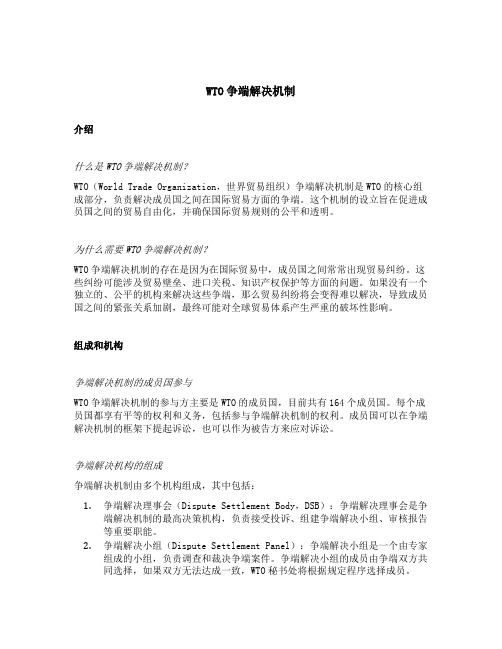
WTO争端解决机制介绍什么是WTO争端解决机制?WTO(World Trade Organization,世界贸易组织)争端解决机制是WTO的核心组成部分,负责解决成员国之间在国际贸易方面的争端。
这个机制的设立旨在促进成员国之间的贸易自由化,并确保国际贸易规则的公平和透明。
为什么需要WTO争端解决机制?WTO争端解决机制的存在是因为在国际贸易中,成员国之间常常出现贸易纠纷。
这些纠纷可能涉及贸易壁垒、进口关税、知识产权保护等方面的问题。
如果没有一个独立的、公平的机构来解决这些争端,那么贸易纠纷将会变得难以解决,导致成员国之间的紧张关系加剧,最终可能对全球贸易体系产生严重的破坏性影响。
组成和机构争端解决机制的成员国参与WTO争端解决机制的参与方主要是WTO的成员国,目前共有164个成员国。
每个成员国都享有平等的权利和义务,包括参与争端解决机制的权利。
成员国可以在争端解决机制的框架下提起诉讼,也可以作为被告方来应对诉讼。
争端解决机构的组成争端解决机制由多个机构组成,其中包括:1.争端解决理事会(Dispute Settlement Body,DSB):争端解决理事会是争端解决机制的最高决策机构,负责接受投诉、组建争端解决小组、审核报告等重要职能。
2.争端解决小组(Dispute Settlement Panel):争端解决小组是一个由专家组成的小组,负责调查和裁决争端案件。
争端解决小组的成员由争端双方共同选择,如果双方无法达成一致,WTO秘书处将根据规定程序选择成员。
3.上诉机构(Appellate Body):上诉机构是争端解决机制的上级机构,负责对争端解决小组的裁决进行上诉审查。
上诉机构由7名成员组成,每个案件由3名成员组成的小组进行审查。
争端解决的程序递交投诉和建立争端解决小组WTO成员国可以递交投诉,表明另一成员国的某项贸易措施违反了国际贸易规则。
在接到投诉后,DSB将召开会议,并与当事国磋商是否合并或委托争端解决小组来解决纠纷。
国际经济法中wto的名词解释

国际经济法中wto的名词解释导言国际经济法是研究国际经济关系的法律学科,涵盖了包括国际贸易法在内的多个方面。
而在国际贸易法中,世界贸易组织(World Trade Organization, WTO)是最重要的国际组织之一。
本文旨在解释一些国际经济法中与WTO相关的重要名词,进一步了解WTO在国际经济关系中的作用和意义。
一、世界贸易组织(WTO)世界贸易组织是由贸易协定履行机构演变而来的国际组织。
其宗旨是促进全球贸易的自由化和公平性,通过制定贸易规则、解决贸易争端和促进贸易谈判等方式实现这一目标。
WTO的成立于1995年,取代了多哈回合之前的关税和贸易总协定(General Agreement on Tariffs and Trade, GATT)。
目前,全球大部分国家都是WTO的成员。
二、最惠国待遇(Most-Favored-Nation, MFN)最惠国待遇是WTO贸易规则的基本原则之一。
它要求WTO成员国在对待其他成员国时不得区别对待,除非存在与非成员国有利且不歧视性的特殊安排。
也就是说,如果一个WTO成员国给予另一个成员国某种优惠待遇,那么该优惠待遇应适用于所有其他成员国,避免贸易壁垒。
三、关税与非关税壁垒(Tariffs and Non-Tariff Barriers)关税是指国家对进口商品征收的税收,是一种常见的贸易壁垒形式。
WTO通过多哈回合谈判和其他贸易谈判,逐步降低和消除了许多国家的关税水平,以促进自由贸易。
非关税壁垒则指除关税以外的其它措施,如配额限制、进口许可证、技术壁垒、反倾销措施等。
WTO通过规则制定和争端解决机制,限制了非关税壁垒的使用,并促使成员国逐步消除这些壁垒。
四、贸易争端解决机制(Dispute Settlement Mechanism)贸易争端解决机制是WTO的核心机构之一,用于解决成员国之间的贸易争端。
当某个成员国认为其他成员国采取了违反WTO规则的贸易措施时,可以向WTO提起贸易争端。
谈WTO争端解决机制中专家组程序性质的界定
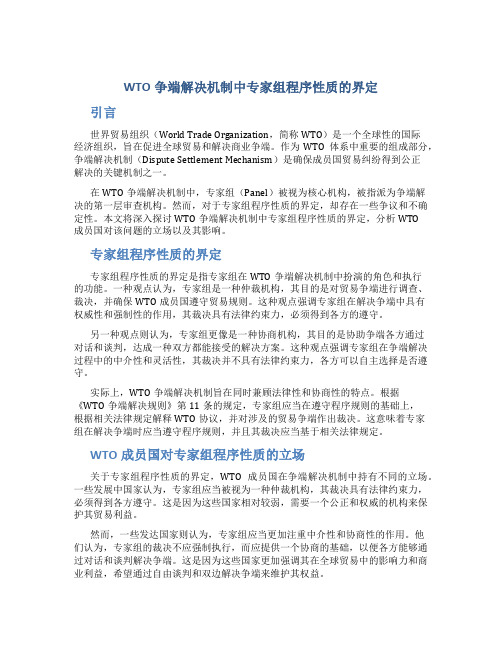
WTO争端解决机制中专家组程序性质的界定引言世界贸易组织(World Trade Organization,简称WTO)是一个全球性的国际经济组织,旨在促进全球贸易和解决商业争端。
作为WTO体系中重要的组成部分,争端解决机制(Dispute Settlement Mechanism)是确保成员国贸易纠纷得到公正解决的关键机制之一。
在WTO争端解决机制中,专家组(Panel)被视为核心机构,被指派为争端解决的第一层审查机构。
然而,对于专家组程序性质的界定,却存在一些争议和不确定性。
本文将深入探讨WTO争端解决机制中专家组程序性质的界定,分析WTO成员国对该问题的立场以及其影响。
专家组程序性质的界定专家组程序性质的界定是指专家组在WTO争端解决机制中扮演的角色和执行的功能。
一种观点认为,专家组是一种仲裁机构,其目的是对贸易争端进行调查、裁决,并确保WTO成员国遵守贸易规则。
这种观点强调专家组在解决争端中具有权威性和强制性的作用,其裁决具有法律约束力,必须得到各方的遵守。
另一种观点则认为,专家组更像是一种协商机构,其目的是协助争端各方通过对话和谈判,达成一种双方都能接受的解决方案。
这种观点强调专家组在争端解决过程中的中介性和灵活性,其裁决并不具有法律约束力,各方可以自主选择是否遵守。
实际上,WTO争端解决机制旨在同时兼顾法律性和协商性的特点。
根据《WTO争端解决规则》第11条的规定,专家组应当在遵守程序规则的基础上,根据相关法律规定解释WTO协议,并对涉及的贸易争端作出裁决。
这意味着专家组在解决争端时应当遵守程序规则,并且其裁决应当基于相关法律规定。
WTO成员国对专家组程序性质的立场关于专家组程序性质的界定,WTO成员国在争端解决机制中持有不同的立场。
一些发展中国家认为,专家组应当被视为一种仲裁机构,其裁决具有法律约束力,必须得到各方遵守。
这是因为这些国家相对较弱,需要一个公正和权威的机构来保护其贸易利益。
wto争端解决机制的大致程序与特点

wto争端解决机制的大致程序与特点该文档是本店铺精心编制而成的,希望大家下载后,能够帮助大家解决实际问题。
会计专业合作社实习报告内容与收获该wto争端解决机制的大致程序与特点该文档下载后可定制修改,请根据实际需要进行调整和使用,谢谢!本店铺为大家提供各种类型的实用资料,如教育随笔、日记赏析、句子摘抄、古诗大全、经典美文、话题作文、工作总结、词语解析、文案摘录、其他资料等等,想了解不同资料格式和写法,敬请关注。
文档下载说明Download tips: This document is carefully compiled by this editor. I hope that after you download it, it can help you solve practical problems. The document wto争端解决机制的大致程序与特点can be customized and modified after downloading, please adjust and use it according to actual needs, thank you! In addition, this shop provides you with various types of practical materials, such as educational essays, diary appreciation, sentence excerpts, ancient poems, classic articles, topic composition, work summary, word parsing, copy excerpts, other materials and so on, want to know different data formats and writing methods, please pay attention!世界贸易组织(WTO)是一个旨在促进国际贸易的多边组织,其争端解决机制(DSM)是其核心功能之一。
国际贸易争端解决程序
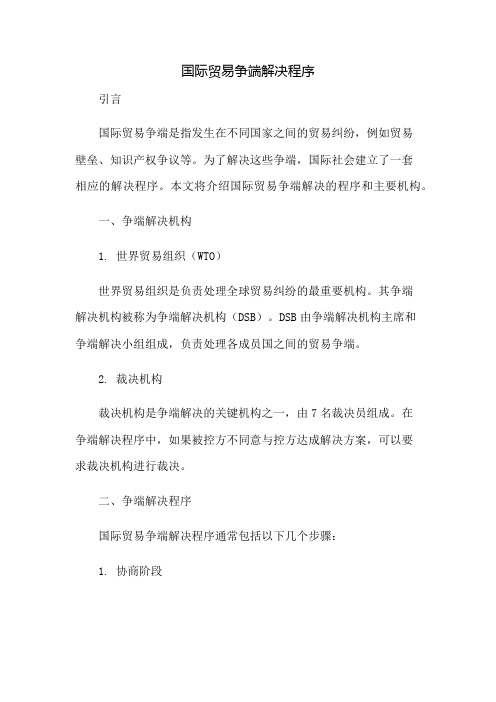
国际贸易争端解决程序引言国际贸易争端是指发生在不同国家之间的贸易纠纷,例如贸易壁垒、知识产权争议等。
为了解决这些争端,国际社会建立了一套相应的解决程序。
本文将介绍国际贸易争端解决的程序和主要机构。
一、争端解决机构1. 世界贸易组织(WTO)世界贸易组织是负责处理全球贸易纠纷的最重要机构。
其争端解决机构被称为争端解决机构(DSB)。
DSB由争端解决机构主席和争端解决小组组成,负责处理各成员国之间的贸易争端。
2. 裁决机构裁决机构是争端解决的关键机构之一,由7名裁决员组成。
在争端解决程序中,如果被控方不同意与控方达成解决方案,可以要求裁决机构进行裁决。
二、争端解决程序国际贸易争端解决程序通常包括以下几个步骤:1. 协商阶段在正式启动争端解决程序之前,各方通常会先进行协商,试图通过和解来解决争端。
如果协商无法达成一致,争端解决程序将正式启动。
2. 请求成立争端解决小组控方向DSB提出请求,要求成立争端解决小组。
争端解决小组由成员国中不与争端有关的国家组成。
3. 争端解决小组程序争端解决小组将听取双方的陈述和准备的证据,并进行详细调查。
小组将就涉及的问题达成一致,并提交报告给DSB。
4. DSB审议和裁决DSB将审核争端解决小组的报告,并就涉及的问题进行审议。
如果无法解决争端,被控方可以直接要求成立裁决机构进行裁决。
5. 裁决和执行裁决机构根据争端解决程序的规定,对争端进行裁决。
各方应履行裁决结果,并执行相关的措施。
国际贸易争端解决程序是为了解决不同国家之间的贸易纠纷而建立的重要机制。
通过世界贸易组织的争端解决机构和裁决机构,各方能够在公平、公正的环境中解决贸易争端,稳定全球贸易秩序。
- 1、下载文档前请自行甄别文档内容的完整性,平台不提供额外的编辑、内容补充、找答案等附加服务。
- 2、"仅部分预览"的文档,不可在线预览部分如存在完整性等问题,可反馈申请退款(可完整预览的文档不适用该条件!)。
- 3、如文档侵犯您的权益,请联系客服反馈,我们会尽快为您处理(人工客服工作时间:9:00-18:30)。
一、 The dispute settlement understanding
The current dispute settlement system was created as part of the WTO Agreement during the Uruguay Round. It is embodied in the Understanding on Rules and Procedures Governing the Settlement of Disputes, commonly referred to as the Dispute Settlement Understanding and abbreviated “DSU” (referred to as such in this guide). The DSU, sets out the procedures and rules that define today’s dispute settlement system. It should however be noted that, to a large degree, the current dispute settlement system is the result of the evolution of rules, procedures and practices developed over almost half a century under the GATT 1947.
Dispute settlement is the central pillar of the multilateral trading system, and the WTO’s unique contribution to the stability of the global economy. Without a means of settling disputes, the rules-based system would be less effective because the rules could not be enforced. The WTO’s procedure underscores the rule of law, and it makes the trading system more secure and predictable. The system is based on clearly-defined rules, with timetables for completing a case. First rulings are made by a panel and endorsed (or rejected) by the WTO’s full membership. Appeals based on points of law are possible. . However, the point is not to pass judgment. The priority is to settle disputes, through consultations if possible.
Total = 1y 3m
(with appeal)
How are disputes settled?
First stage: consultation (up to 60 days). Before taking any other actions the countries in dispute have to talk to each other to see if they can settle their differences by themselves. If that fails, they can also ask the WTO directorgeneral to mediate or try to help in any other way. Second stage: the panel (up to 45 days for a panel to be appointed, plus 6 months for the panel to conclude). If consultations fail, the complaining country can ask for a panel to be appointed. The country “in the dock” can block the creation of a panel once, but when the Dispute Settlement Body meets for a second time, the appointment can no longer be blocked (unless there is a consensus against appointing the panel).
.
Officially, the panel is helping the Dispute Settlement Body make rulings or recommendations. But because the panel’s report can only be rejected by consensus in the Dispute Settlement Body, its conclusions are difficult to overturn. The panel’s findings have to be based on the agreements cited. The panel’s final report should normally be given to the parties to the dispute within six months. In cases of urgency, including those concerning perishable goods, the deadline is shortened to three months
How long to settle a dispute?
These approximate periods for each stage of a dispute settlement procedure are target figures — the agreement is flexible. In addition, the countries can settle their dispute themselves at any stage. Totals are also approximate. 60 days 45 days 6 months 3 weeks 60 days Total = 1 year 60-90 days 30 days Consultations, mediation, etc Panel set up and panel lists appointed Final panel report to parties Final panel report to WTO members Dispute Settlement Body adopts report (if no appeal) (without appeal) Appeals report Dispute Settlement Body adopts appeals report
ห้องสมุดไป่ตู้
.
(2) No non-governmental actors
Since only WTO Member governments can bring disputes, it follows that private individuals or companies do not have direct access to the dispute settlement system, even if they may often be the ones (as exporters or importers) most directly and adversely affected by the measures allegedly violating the WTO Agreement. The same is true of other non-governmental organizations with a general interest in a matter before the dispute settlement system (which are often referred to as NGOs). They, too, cannot initiate WTO dispute settlement proceedings. Of course, these organizations can, and often do, exert influence or even pressure on the government of a WTO Member with respect to the triggering of a dispute. Indeed, several WTO Members have formally adopted internal legislation under which private parties can petition their governments to bring a WTO dispute.
二、Participants in the Dispute Settlement System
(1)Parties and third parties
The only participants in the dispute settlement system are the Member governments of the WTO, which can take part either as parties or as third parties. The WTO Secretariat, WTO observer countries, other international organizations, and regional or local governments are not entitled to initiate dispute settlement proceedings in the WTO. The DSU sometimes refers to the Member bringing the dispute as the “complaining party” or the “complainant” (this guide mostly uses the term “complainant”). No equivalent short term is used for the “party to whom the request for consultations is addressed”. The DSU sometimes also speaks of “Member concerned”. In practice, the terms “respondent” or “defendant” are commonly used; this guide mostly uses the term “respondent”
